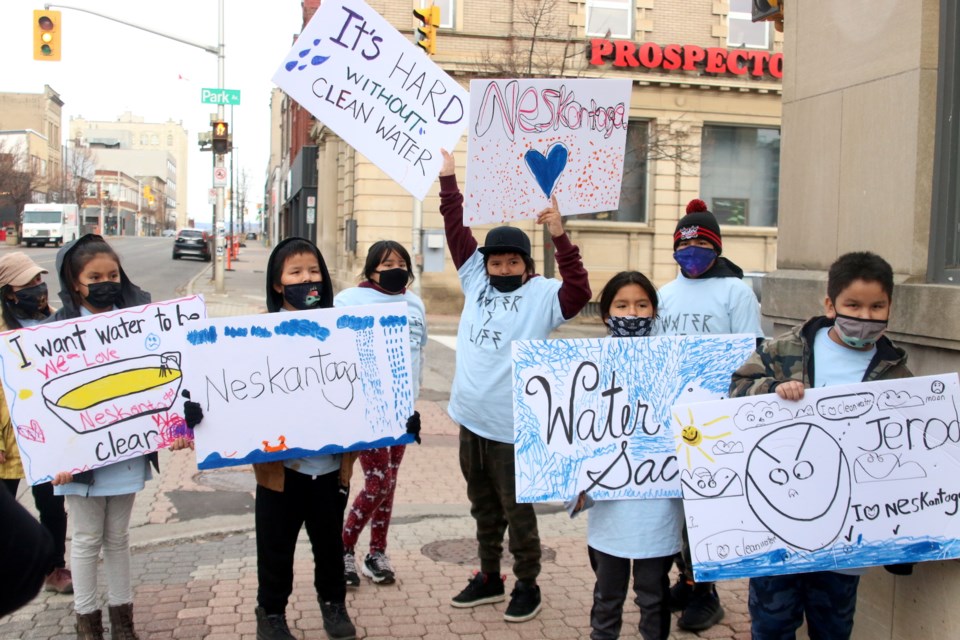The federal government has reached an agreement in principle to settle a class action lawsuit with numerous First Nations, tentatively committing nearly $8 billion in funding to address a lack of access to clean water and compensate those who have long lived without it.
Minister of Indigenous Services Marc Miller announced the agreement along with leaders from Tataskweyak Cree Nation, Curve Lake First Nation, and Neskantaga First Nation on Friday.
Over 140,000 people from more than 200 First Nations could be eligible for compensation, along with 120 First Nations. Details remain to be negotiated as part of the settlement agreement, which will also require court approval.
The agreement in principle includes $1.5 billion in compensation for individuals deprived of clean drinking water, a $400 million First Nation “economic and cultural restoration fund,” and at least $6 billion to support access to safe drinking water on reserve, though that includes some funding that had already been announced.
It also stipulates the creation of a First Nations Advisory Committee on Safe Drinking Water, a renewed commitment to Canada's Action Plan to lift all long-term drinking water advisories, modernization of Canada's First Nations drinking water legislation, and support for First Nations to develop their own safe drinking water by-laws and initiatives, according to the government.
Compensation levels will relate to factors including the number of years lived under an advisory, remoteness of community (to reflect additional hardships from remoteness), said Michael Rosenberg of McCarthy Tétrault LLP, counsel to the three First Nations.
Chief Wayne Moonias of Neskantaga First Nation, located about 450 kilometres north of Thunder Bay, said the agreement was long overdue.
The community remains under a boil water advisory first implemented in 1995 – the longest in the country.
“We often wonder in our community why it has taken so long to provide something to First Nations,” he said at Friday’s announcement. “Still to this day, our community is under a boil water advisory [and] our water treatment plant is incomplete and unable to provide the safe water everybody else in the country is able to get.”
Asked why the federal government hadn’t acted more quickly, Miller pointed much of the blame at failures by previous governments.
“There is no credible excuse for a country such as Canada to take this long,” he said, but defended his own government’s record on the issue.
The Trudeau government failed to meet its own deadline of March 2021 on a high-profile commitment to end boil water advisories on reserve. As of July 30, 108 long-term advisories had been lifted since the government took office in 2015, but another 51 remained in place.
The government says it has committed over $4.2 billion to First Nations to build and maintain water and wastewater infrastructure over that period.
While Miller wouldn’t commit to a new deadline to resolve the remaining long-term advisories, he said Canadians should expect to see more resolved over the coming months.
The agreement announced Friday would also go beyond funding to lift advisories, Miller said, allowing communities autonomy to drive solutions, offering operational and maintenance funding, and supporting training for First Nations members to ensure long-term viability.
The agreement “signals a new era” in the decades-long fight for clean water, said Chief Doreen Spence
of the Tataskweyak Cree Nation, where a long-term boil water advisory was declared in 2018.
“Not having safe water to drink has had devastating consequences on every generation in our community,” she said. “Some people have left to relocate elsewhere.”
Chief Emily Whetung of Curve Lake First Nation said unsafe water had become a “a way of life” in too many First Nations, causing physical and mental health problems and limiting economic opportunity.
The success in reaching agreement rested on decades of advocacy work by Indigenous people across Canada, she said.
Rosenberg, one of the lawyers representing the First Nations, called it a day for celebration of a hard fought victory.
“Because First Nations had the courage to pursue justice, the painful legacy of long-term drinking water advisories will finally be history,” he said. “Today the Government deserves real credit for committing to turn a corner. All Canadians should be proud of these measures to end a water crisis.”
The deal will provide compensation for harms going back around a quarter century, Miller said, and includes a provision for dispute resolution if terms are not met.
Having that “enforcement mechanism” is key to winning First Nations trust in the agreement, said Moonias.
“We’re aware promises and commitments have been made before, and our people have been on the wrong side of [that],” he said.
